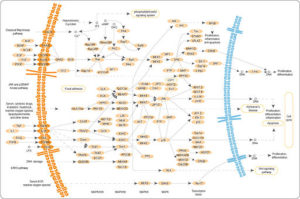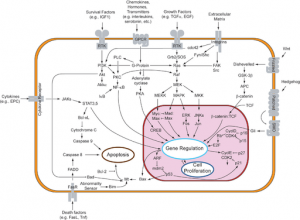 This week, Vancouver is hosting the 16th International Conference of Biochemistry and Molecular Biology. Jointly organized by three associations—the International Union of Biochemistry and Molecular Biology, the Canadian Society for Molecular Biosciences and the Pan-American Association for Biochemistry and Molecular Biology—conference attendees will attend sessions over five days. These include two plenaries delivered by Nobel Prize winners, including Dr. Andrew Fire (2006; RNA gene silencing-interference by double stranded dsRNA).
This week, Vancouver is hosting the 16th International Conference of Biochemistry and Molecular Biology. Jointly organized by three associations—the International Union of Biochemistry and Molecular Biology, the Canadian Society for Molecular Biosciences and the Pan-American Association for Biochemistry and Molecular Biology—conference attendees will attend sessions over five days. These include two plenaries delivered by Nobel Prize winners, including Dr. Andrew Fire (2006; RNA gene silencing-interference by double stranded dsRNA).
The conference theme this year is “Signalling Pathways in Development, Diseases and Aging.” This is certainly a broad scope, since the three cover just about everything a cell will do in its lifetime. But why the excitement over cell signalling pathways? What are they, and how are they involved in aging, disease and development? And just why are biochemists and molecular biologists so interested anyway?
In a nutshell, it’s all about exploration.
Every cell has specific functions for metabolism, gene regulation and signalling. Stimuli from various sources, internal and external, let the cell know when to start or stop these these functions according to its needs and environment. Once the stimulus arrives at the cell, it passes along specific pathways until it triggers an action. During health, signals prepare the cell to grow, make hormones, store glucose and multiply, for example. In sickness, the pathways prime for survival mode by releasing antibodies or inflammatory agents, or by repelling the invaders in other ways, depending on the cell type involved. Signalling pathways also coordinate activity when the time comes for a cell to die.
 Signalling pathways aren’t physical pathways like channels or tiny intracellular roads. Instead, they are made up of networks of messenger molecules that pass the signal along a chain as a wave of activations or inactivations. These networks rely on protein-protein interactions, enzyme activity, biochemical compounds, receptor binding and more to relay the message. Since the pathways are often extremely complex and involve many different messengers, cells are able to respond quickly and appropriately to a wide range of situations.
Signalling pathways aren’t physical pathways like channels or tiny intracellular roads. Instead, they are made up of networks of messenger molecules that pass the signal along a chain as a wave of activations or inactivations. These networks rely on protein-protein interactions, enzyme activity, biochemical compounds, receptor binding and more to relay the message. Since the pathways are often extremely complex and involve many different messengers, cells are able to respond quickly and appropriately to a wide range of situations.
What’s more exciting about this exquisitely sensitive internal mechanism is that each step in the signalling pathway is a potential target for drug action; knowing where the pathways go wrong and understanding how disease hijacks certain steps opens the door to treatment. For example, knowing about the signalling cascade after acute spinal injury points to alarmins as possible targets for inteventions. Understanding signalling inside worms that defy aging helps researchers examine the process inside our human bodies. Finding out that cancer modulates signalling pathways in very subtle ways, such as changing messenger and receptor abundancies, can have big implications for patients in the search for personalized medicine therapies. Each time researchers unravel a new step in a signalling pathway, they also kick off the search for new therapies or tie up loose ends for drug discovery.
As little kids, many of us imagined the excitement of being explorers, adventuring through strange and new lands. As adults, not many of us manage more than a week or two at a tropical resort or city break, and the chances of going into space are slim. However, for scientists, exploring new territories is an everyday opportunity, and cell signalling pathways are as exciting as uncharted rivers. No wonder biochemists and molecular biologists are happy to devote an entire conference to cell signalling pathways.
PS: For an extremely beautiful and cool video representation of the way that cancer alters cell signalling over time, check out this video: Signals (2011) from Casey Reas and Ben Fry.
16th annual International Conference of Biochemistry and Molecular Biology
July 17–21, 2016, Vancouver, BC